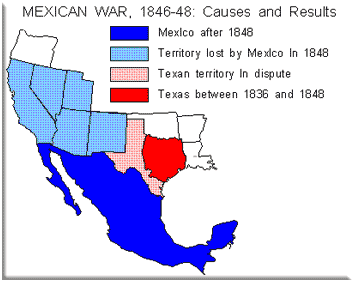Background of the Mexican War
The Mexican War was likely an unnecessary conflict with multiple causes, including the following:
- The decision of the Tyler administration in March, 1845 to annex Texas, then an independent republic, but still claimed by Mexico
- The stationing of U.S. soldiers near the Rio Grande on territory regarded by many as Mexican soil
- The Polk administration was an advocate of the country's Manifest Destiny, a belief that God had intended the nation to stretch across the entire continent; the Southwest and California were especially appealing targets; further, Southern slaveowners were enthusiastic about the possibility of adding additional slave states to the Union
- Some in the United States viewed Mexico as a weak nation and incapable of holding on to territory desired by other nations; Britain, a continuing rival of the United States, had been casting envious glances at various parts of Mexico
- Mexico had alienated many in Congress by its failure to settle debts owed to U.S. citizens
- An incautious Mexican nationalism led their government to underestimate American military might and resolve; the Mexicans were confident of victory and anticipated an early reoccupation of Texas.

Despite being inclined toward war, President Polk did attempt a diplomatic fix by sending the
Slidell Mission to Mexico City. Diplomatic failure was followed quickly by hostilities and warfare developed on the following fronts:
Some, including
Ulysses S. Grant, viewed the conflict as an unjust war and regretted their participation.
Peace was achieved in the
Treaty of Guadalupe Hidalgo and the results of the war had both immediate and long-term consequences.
 Despite being inclined toward war, President Polk did attempt a diplomatic fix by sending the Slidell Mission to Mexico City. Diplomatic failure was followed quickly by hostilities and warfare developed on the following fronts:
Some, including Ulysses S. Grant, viewed the conflict as an unjust war and regretted their participation.
Peace was achieved in the Treaty of Guadalupe Hidalgo and the results of the war had both immediate and long-term consequences.
Despite being inclined toward war, President Polk did attempt a diplomatic fix by sending the Slidell Mission to Mexico City. Diplomatic failure was followed quickly by hostilities and warfare developed on the following fronts:
Some, including Ulysses S. Grant, viewed the conflict as an unjust war and regretted their participation.
Peace was achieved in the Treaty of Guadalupe Hidalgo and the results of the war had both immediate and long-term consequences.